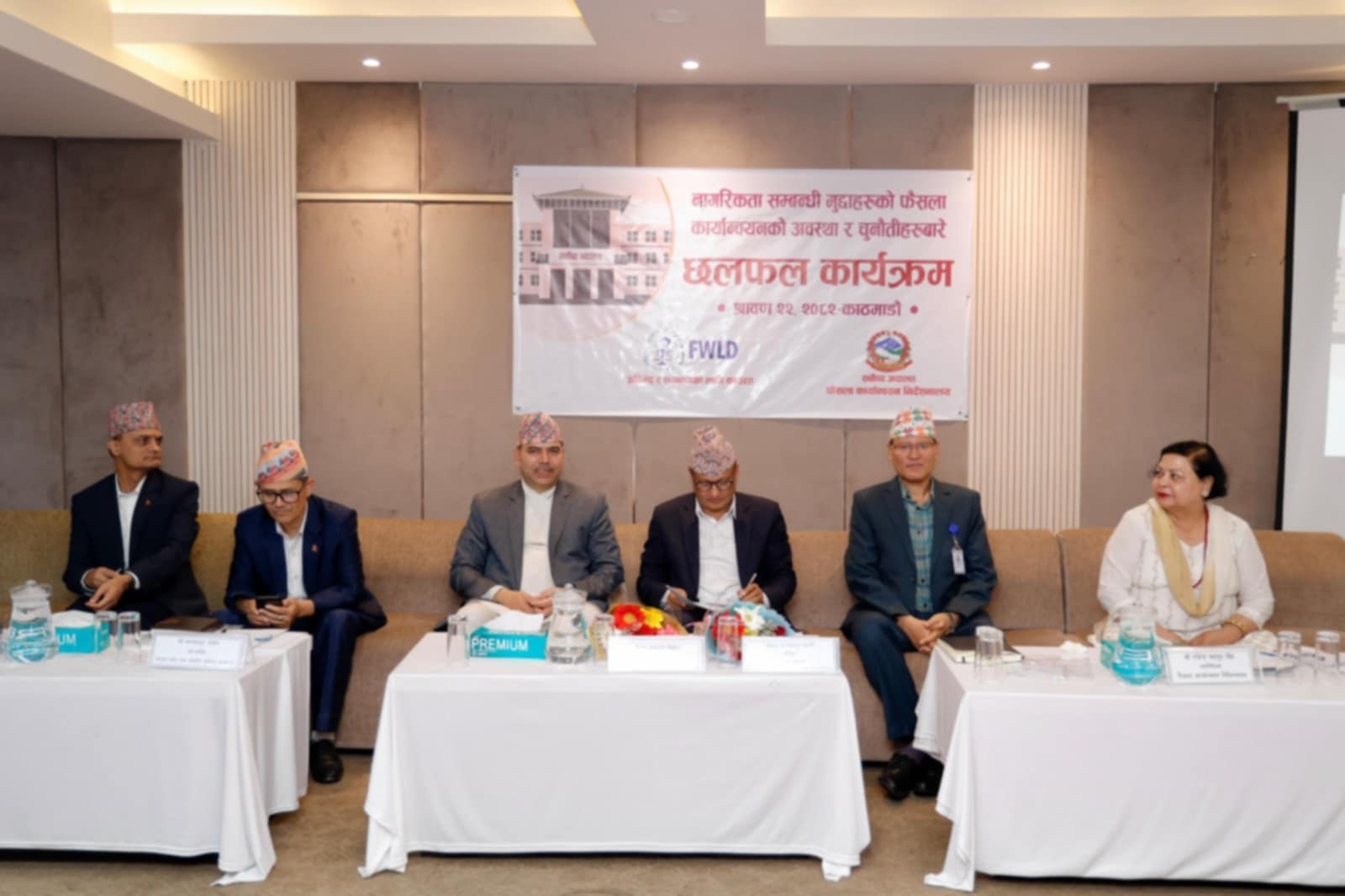

KATHMANDU: A recent discussion held in Kathmandu concluded that verdicts issued by the Supreme Court on citizenship-related cases will not be established as legal precedents.
Organized by the Supreme Court Judgement Implementation Directorate in collaboration with the Forum for Women, Law and Development (FWLD), the program focused on the status and challenges of implementing court rulings on citizenship.
Participants argued that since citizenship issues are often deeply individualized, the court’s rulings cannot be generalized or treated as legal benchmarks for other cases.
During the event, citizenship rights activist Kumar Joshi recounted his long struggle, stating that even two years after the Supreme Court issued a verdict in his favor, he has not received his citizenship.
Joshi, who said he grew up as a street child, shared that the Supreme Court had directed the Kathmandu District Administration Office to issue him a citizenship certificate. However, the office refused to do so, citing that his documents were registered in Lalitpur. As a result, his legal identity remains in limbo.
Director of the Judgement Implementation Directorate Janak Prasad Sharma gave a presentation on the historical evolution of Nepal’s citizenship laws, comparative practices in other countries, and key Supreme Court verdicts.
He stressed that proper implementation of verdicts requires inter-agency coordination.
Supreme Court Registrar Man Bahadur Karki acknowledged difficulties in implementing verdicts but insisted they must be resolved through cooperation among relevant institutions.
He cited the example of the U.S., where Supreme Court decisions carry the weight of law, and criticized Nepal’s tendency to avoid implementation by pointing to legal ambiguities.
Since verdicts are based on the Constitution—the supreme law of the land—they should not be obstructed by technical or bureaucratic hurdles, he said.
Director General of the Judgement Implementation Directorate Gajendra Bahadur Singh emphasized that the Directorate acts as a bridge between the Supreme Court and the implementing bodies.
He stressed that no individual should be rendered stateless and urged agencies to work with that principle in mind.
Deputy Attorney General Ishwari Prasad Dhakal advised officials to avoid getting stuck in procedural technicalities and instead focus on enforcing the Constitution-based verdicts.
He recommended amending necessary forms and sensitizing local government officials to facilitate implementation.
Joint Secretary at the Ministry of Law, Man Bahadur Aryal, stressed the need for continuous legal reform.
He said that coordinating existing laws with constitutional mandates could resolve most of the existing issues and called for simplifying administrative procedures.
FWLD senior advocate Meera Dhungana pointed out that failure to treat Supreme Court verdicts as precedent has resulted in many cases where affected individuals remain without citizenship despite favorable rulings.
FWLD has documented numerous such cases, she added.
Administrative officials from Bhaktapur and Kathmandu also expressed concern.
Assistant Chief District Officer of Bhaktapur, Chiranjeevi Bhandari, said that there is no problem issuing citizenship certificates to those who have completed the required procedures. However, he claimed that courts often issue verdicts without considering jurisdictional limits, leading to implementation difficulties.
Assistant CDO of Kathmandu, Purna Prasad Bhattarai, said that coordination with local governments had helped solve many problems, but many cases remain unresolved due to gaps in the law.
Registrar of the Supreme Court Bhadrakali Pokharel said that the purpose of the program was to encourage dialogue, build common understanding, and ease legal interpretation in the future.
He added that the Supreme Court considers citizenship cases a high priority and emphasized that without implementation, affected individuals may never receive justice.
Director Punam Kafle of the Judgement Implementation Directorate remarked that citizenship is not merely an administrative document or legal formality but a gateway to identity, dignity, rights, and access to opportunities.
She said court verdicts on citizenship are not just legal instructions but constitutional decisions that profoundly impact the lives of individuals.